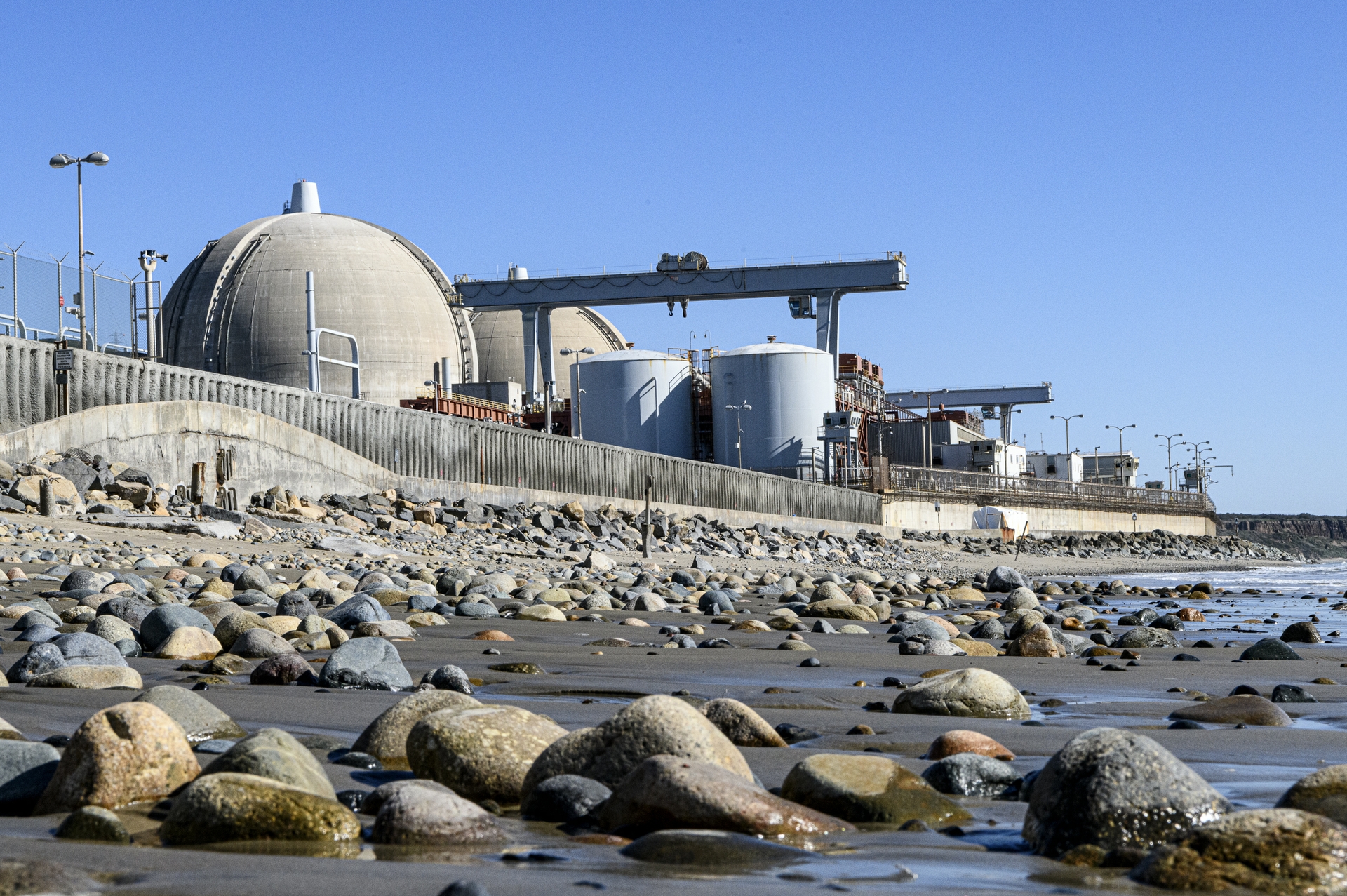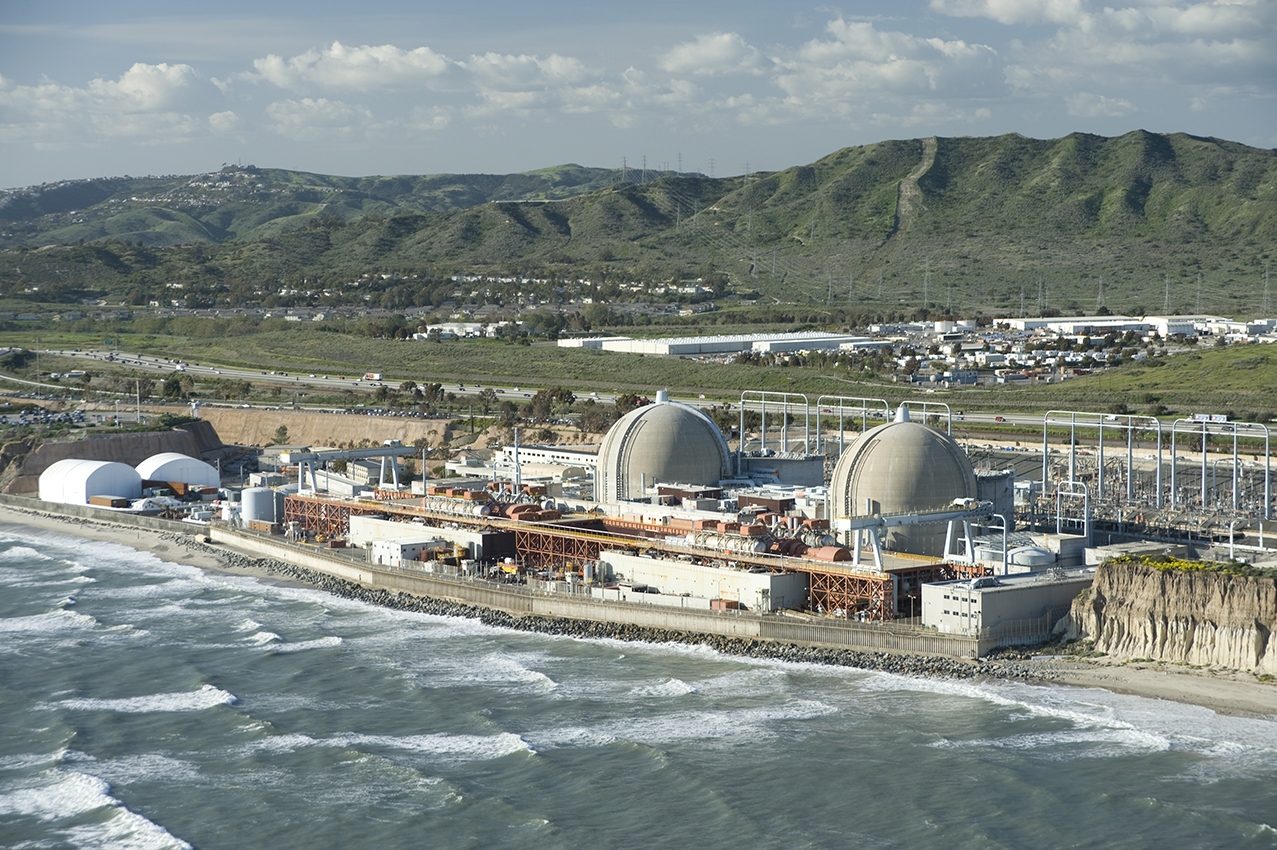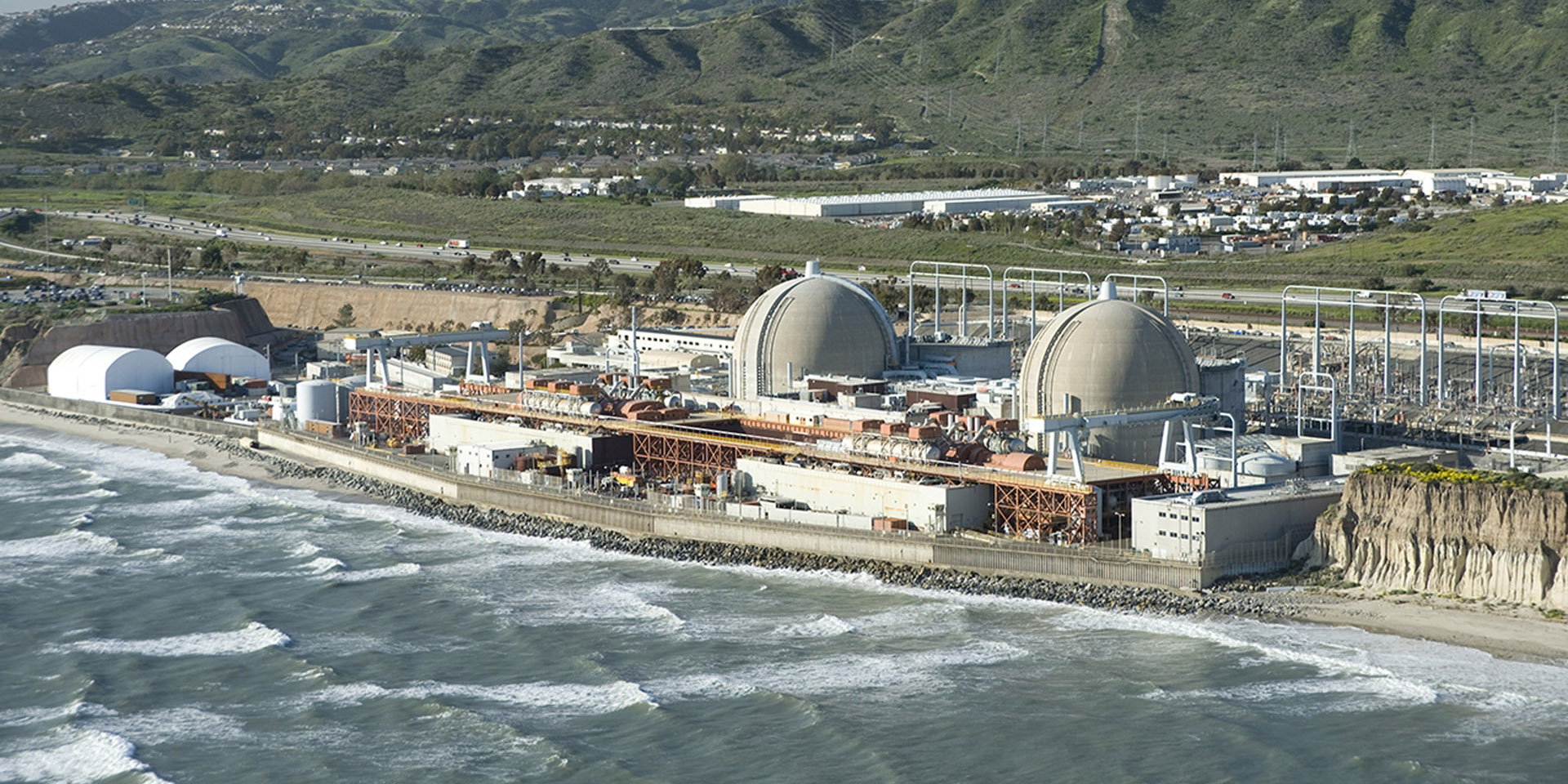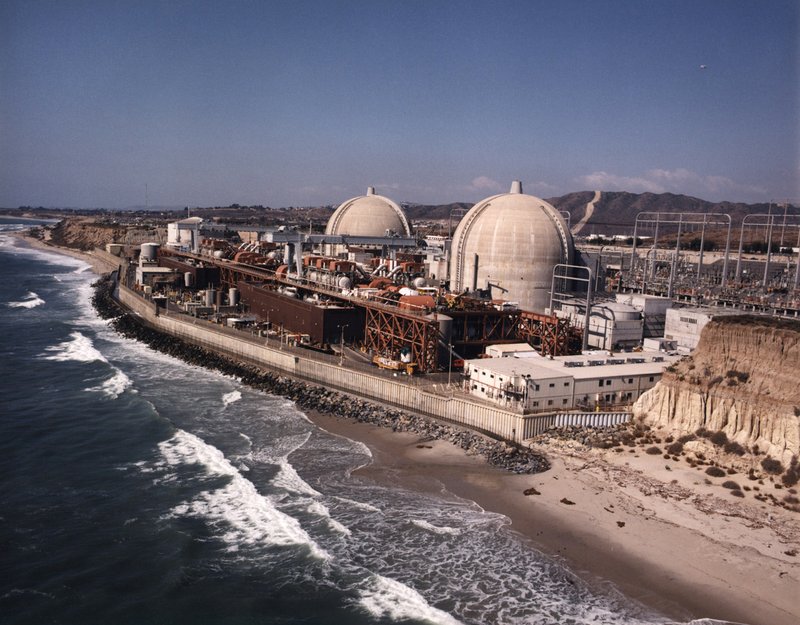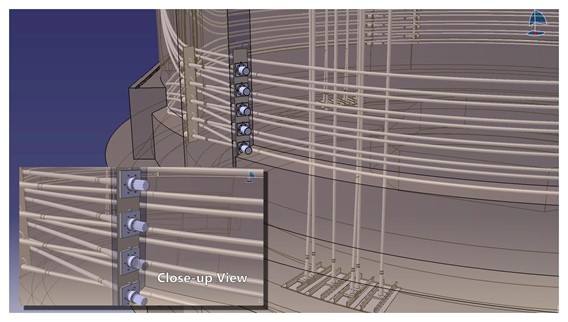The San Onofre Nuclear Generating Station. (Photo: SCE)
The Nuclear Regulatory Commission noted two low-level regulatory violations during a recent inspection of the San Onofre Nuclear Generating Station, which is currently undergoing decommissioning in Southern California. The violations involved the shipment of two reactor pressurizers from San Onofre to EnergySolutions’ disposal facility in Clive, Utah.
The author on a walking tour of SONGS, with the reactor dome and dry cask storage in the background. (Photos by Amelia Tiemann)
Recently I had the opportunity to be the American Nuclear Society’s boots on the ground when I traveled to San Diego during Nuclear Science Week. I got to meet dozens of members of the nuclear community, tour the San Onofre Nuclear Generating Station, attend a screening of Oliver Stone’s Nuclear Now, and listen to a lively panel discussion about the importance of nuclear energy for solving climate change. It was a fun and illuminating experience, and I left with the impression that, excitingly, nuclear curiosity is on the rise.
The San Onofre nuclear power plant. (Photo: SONGS)
The Department of Energy’s Office of Nuclear Energy will provide an update to the San Onofre Community Engagement Panel (CEP) on spent fuel transportation preparations on Thursday, October 26, at its quarterly meeting. The virtual meeting will begin at 2:00 p.m. (PDT) via Microsoft Teams video conference.
Members of the public can view the meeting online by visiting the SONGS community website for the link to the Microsoft Teams meeting and to register to comment.
The SONGS independent spent fuel storage installation. (Photo: SCE)
Spent Fuel Solutions, which advocates for a permanent disposal solution for the nation’s spent nuclear fuel, will be holding an informational webinar on Friday, September 15, from 11:00 a.m. to noon (PDT).
San Onofre Nuclear Generating Station. (Photo: Southern California Edison)
Ten years ago this month, on June 7, 2013, Southern California Edison (SCE) communicated the decision to permanently shutter the San Onofre Nuclear Generating Station (SONGS). The decision set in motion the decommissioning of a plant that had provided steady baseload power for the region since 1968 during a period of tremendous growth in the western United States. In the end, issues presented by the planned replacement steam generators that were intended to support future plant operations proved too large of a hurdle, and the plant was forced to retire.
The San Onofre nuclear power plant.
The San Onofre Nuclear Generating Station (SONGS) recently shared a few videos on its YouTube channel, showing recent progress Southern California Edison has made in dismantling the plant’s turbine building. Decommissioning of the nuclear power plant, which permanently ceased operations in 2013, is being conducted by SONGS Decommissioning Solutions, a joint venture of EnergySolutions and AECOM.
Southern California Edison has a plan—and it just might build momentum to solve the nation’s spent nuclear fuel disposal dilemma.
Imagine it’s January 1998. A specially equipped train from the Department of Energy rolls up to the San Onofre Nuclear Generating Station (SONGS) to pick up spent nuclear fuel and take it to the Yucca Mountain repository in Nevada. This scene is repeated thousands of times at nuclear plant sites across the U.S. over the ensuing decades. The solution to permanent spent fuel disposal as outlined in the Nuclear Waste Policy Act (and its amendments) is working as intended. The nation’s commercial spent fuel is safely isolated deep underground for the long term.
But that is not what happened. Work on Yucca Mountain has been stalled for a full decade, and the organization within the DOE that by law is responsible for managing the spent fuel program has been defunded and disbanded.
A graphic representation of the tendons encircling the San Onofre containment domes. (Image: SCE)
A nearly yearlong effort to de-tension and remove more than 400 steel cables, known as tendons, from the two containment domes of the San Onofre Nuclear Generating Station (SONGS) was recently completed, with only one minor first aid incident recorded, according to Southern California Edison.
In storage at San Onofre for 18 years, the 670-ton SONGS-1 reactor pressure vessel undertook a 51-day trip across three states to its final disposal site.
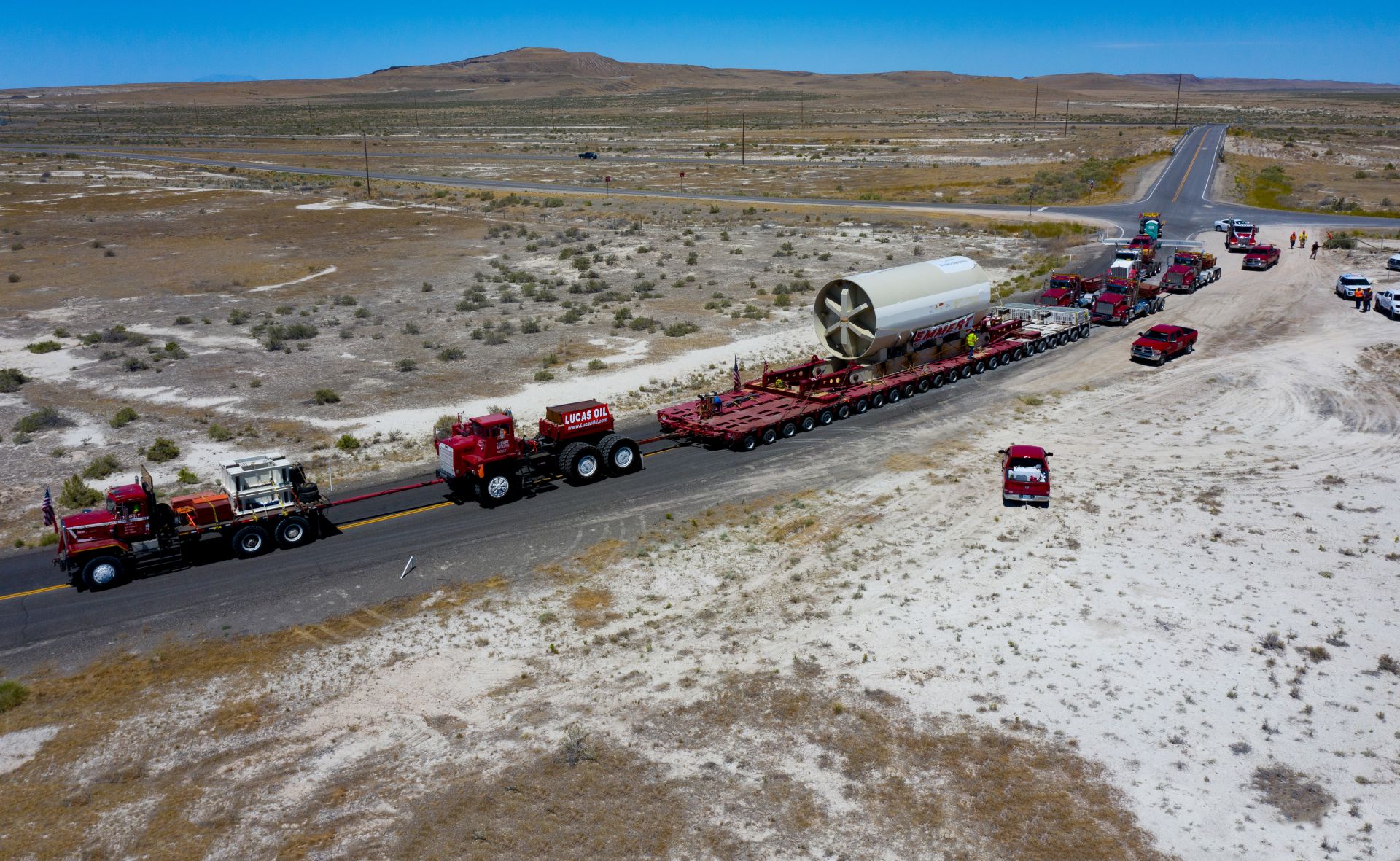
Six large trucks were used to push and pull the SONGS-1 reactor pressure vessel 400 miles through Nevada and into Utah with a maximum speed of 10 miles per hour over a 10-day period. Photo: EnergySolutions
July 14 marked a milestone in the decommissioning of the San Onofre Nuclear Generating Station (SONGS), as the Unit 1 reactor pressure vessel (RPV) completed a seven-week journey from Southern California to EnergySolutions’ Clive disposal facility in Utah. The approximately 670-ton RPV package, containing the pressure vessel from the previously decommissioned SONGS-1, pieces of radioactive metal, and grout for radiation shielding, left San Onofre on May 24, traveling by rail to a location outside Las Vegas, where it was transferred to a platform trailer to be transported the remaining 400 miles to Clive, about 75 miles west of Salt Lake City.
“This project was a very complex undertaking that required approvals and/or coordination with over two dozen federal, state, and local agencies and government entities,” said Todd Eiler, director of the EnergySolutions Projects Group, which handled the transport. “The coordinated effort with the rail lines and departments of transportation in California, Nevada, and Utah resulted in another safe and successful large component shipment managed by the EnergySolutions Projects Group.”
